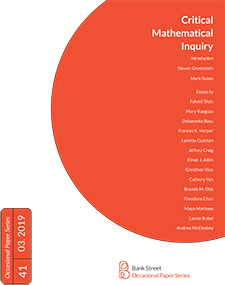Number 41
(2019)
Critical Mathematical Inquiry
Full Issue
Articles
Teaching for Social Justice through Critical Mathematical Inquiry
Steven Greenstein and Mark Russo
Quantitative Civic Literacy
Mary Candace Raygoza
Cultivating a Space for Critical Mathematical Inquiry through Knowledge-Eliciting Mathematical Activity
Debasmita Basu and Steven Greenstein
Collaboration and Critical Mathematical Inquiry: Negotiating Mathematics Engagement, Identity, and Agency
Frances K. Harper
The World in Your Pocket: Digital Media as Invitations for Transdisciplinary Inquiry in Mathematics Classrooms
Lynette DeAun Guzmán and Jeffrey Craig
Power to Change: Math as a Social-Emotional Language in a Classroom of 4 and 5 Year Olds
Elinor J. Albin and Gretchen Vice
Mathematics for Whom: Reframing and Humanizing Mathematics
Cathery Yeh and Brande M. Otis
Elementary Mathematics and #BlackLivesMatter
Theodore Chao and Maya M. Marlowe
The “Soft Bigotry of Low Expectations” And Its Role in Maintaining White Supremacy through Mathematics Education
Laurie Rubel and Andrea V. McCloskey


Steven Greenstein is an Associate Professor in the Department of Mathematical Sciences at Montclair State University. He enjoys thinking about mathematical things… and how people think about mathematical things. Through his work, he aims to democratize access to authentic mathematical activity that honors the diversity of learners’ mathematical thinking, that is both nurturing of and nurtured by intellectual agency, and that is guided by self-directed inquiry, mathematical play, and the having of wonderful ideas.
Guest Editor Mark Russo

Mark Russo is the district supervisor of mathematics and computer science for the Pascack Valley Regional High School District in Montvale, NJ, and an adjunct professor at Montclair State University. He is interested in promoting equity in schools, supporting effective mathematics teaching and learning, and helping students experience the beauty and power of mathematics and statistics. He is currently exploring the development of algebraic reasoning in computer science and the utilization of quantitative reasoning through interdisciplinary connections between statistics and social studies (SASS).